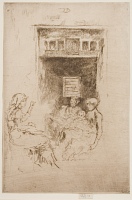Bead Stringers | ||
| Number: | 235 | |
| Date: | 1880 | |
| Medium: | etching and drypoint | |
| Size: | 229 x 154 mm | |
| Signed: | butterfly at left (8-final) | |
| Inscribed: | no | |
| Set/Publication: | 'Second Venice Set', 1886 | |
| No. of States: | 11 | |
| Known impressions: | 40 | |
| Catalogues: | K.198; M.195; W.164 | |
| Impressions taken from this plate (40) | ||
TECHNIQUE
Whistler apparently wrestled with the composition of Bead Stringers, as the first known states show superimposed outlines of at least two versions of an unfinished figure on the left side of the image. Furthermore, cancellation lines scrawled over the incomplete seated figure in the third state suggest that the plate was temporarily abandoned at an early stage. However, Whistler ultimately scraped off the early ideas for figures at both left and right and completed the composition for inclusion in the 'Second Venice Set'. Major changes to the figures were done in etching, while smaller adjustments to shading were mostly executed in drypoint.
PRINTING
Over forty impressions are known. The earliest impressions known are in dark brown ink on laid paper (see  ,
,  ). In printing many proofs of the later states Whistler turned to black ink, still on laid paper (
). In printing many proofs of the later states Whistler turned to black ink, still on laid paper ( ,
,  ,
,  ). Similarly in the cancelled state, impressions are frequently in black ink on an ivory laid paper (
). Similarly in the cancelled state, impressions are frequently in black ink on an ivory laid paper ( ,
,
 ,
,
 ,
,
 ).
).
 ,
,  ). In printing many proofs of the later states Whistler turned to black ink, still on laid paper (
). In printing many proofs of the later states Whistler turned to black ink, still on laid paper ( ,
,  ,
,  ). Similarly in the cancelled state, impressions are frequently in black ink on an ivory laid paper (
). Similarly in the cancelled state, impressions are frequently in black ink on an ivory laid paper ( ,
,
 ,
,
 ,
,
 ).
).
Beadstringers was printed for the 'Second Venice Set' from the sixth state on, with most impressions in the final two states. Documents record some details of the later printing of Bead Stringers. The lists overlap, and not all are dated, so it is not easy to get a complete picture. An impression of the sixth state - reproduced below - was printed in black ink on cream laid paper for Dowdeswell's by Émile Frédéric Salmon (1840-1913), before Whistler decided to take over the printing ( ). 5
). 5
 ). 5
). 5 5: W. Dowdeswell to Whistler, [March/April 1886], GUW #08680; MacDonald 2001, pp.120-122.
There are some discrepancies in the records. However, on 2 October 1886 Dowdeswell sent 'the list up to date and hour even, of every proof received' including only three 'Bead Stringers' and on 15 January 1887 the firm said that only five had been received in all, leaving, it would seem, forty still to print and/or deliver. 7
The plate was finally cancelled and an impression from the cancelled plate received by Dowdeswell's on 25 February 1887 and Whistler delivered 'Forty two proofs' the next day to Messrs Dowdeswell. 8 It is possible that this batch of impressions was numbered, for small, neat, pencil numbers have been found on some of the impressions, including '3' or '13' ( ), '14' (
), '14' ( ), and '31' (
), and '31' ( ). However, these could have been later, dealer's notations.
). However, these could have been later, dealer's notations.

Although the print did not rely on surface tone as much as some prints, some impressions were carefully wiped, with more tone at the bottom than at the top of the plate ( ). Impressions were usually trimmed to the platemark leaving a tab for the butterfly signature and 'imp.' to show that Whistler had printed them. Judging both by the recorded printing of the 'Second Venice Set', and the style of butterfly on the tab, most impressions were printed between October 1886 and February 1887 (see
). Impressions were usually trimmed to the platemark leaving a tab for the butterfly signature and 'imp.' to show that Whistler had printed them. Judging both by the recorded printing of the 'Second Venice Set', and the style of butterfly on the tab, most impressions were printed between October 1886 and February 1887 (see  , reproduced above;
, reproduced above;  ,
,  ,
,  ).
).
 ), '14' (
), '14' ( ), and '31' (
), and '31' ( ). However, these could have been later, dealer's notations.
). However, these could have been later, dealer's notations.
Although the print did not rely on surface tone as much as some prints, some impressions were carefully wiped, with more tone at the bottom than at the top of the plate (
 ). Impressions were usually trimmed to the platemark leaving a tab for the butterfly signature and 'imp.' to show that Whistler had printed them. Judging both by the recorded printing of the 'Second Venice Set', and the style of butterfly on the tab, most impressions were printed between October 1886 and February 1887 (see
). Impressions were usually trimmed to the platemark leaving a tab for the butterfly signature and 'imp.' to show that Whistler had printed them. Judging both by the recorded printing of the 'Second Venice Set', and the style of butterfly on the tab, most impressions were printed between October 1886 and February 1887 (see  , reproduced above;
, reproduced above;  ,
,  ,
,  ).
).


